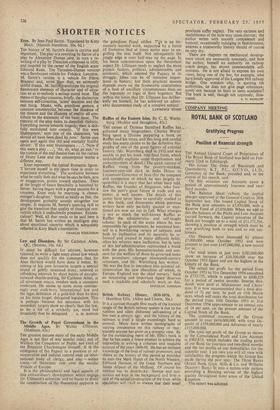THE career of Thomas Stamford Raffles has , attracted many
biographers. Charles Wurtz- 'burg spent a lifetime preparing a book on Raffles and his times, and this long and careful study has many claims to be the definitive bio- graphy of one of the great figures of colonial history. (Mr. Wurtzburg died in 1952 and was unable to put his book into final form, which undoubtedly explains some shapelessness and embarrassment of detail.) The quick success of Raffles, rising from the poverty-stricken. fourteen-year-old clerk in India House to Lieutenant-Governor of Java (for the conquest end occupation of which he was largely re- sponsible) is a story that has often' been told. Rallies, the founder of, Singapore. who fore- saw the port's great future in trade and sea power, is well known. The details of this career have never been so carefully studied as in this book, and documents which previous writers have only partially quoted or men- tioned are now set out in full. What emerges is not so much the well-known Raffles as Raffles the administrator and self-taught scholar. In each of the areas where he was responsible for government, he interested him- self in a bewildering variety of subjects, and both by inclination and by necessity he re- formed and created in many different fields; often his reforms were ineffective, but in spite of this his' administration represented a break with the past. His humanitarianism and con- cern for the welfare of those he governed make him prominent amongst nineteenth-century reformers, and Mr. Wurtzburg has written : 'He was the first to introduce into colonial ad- ministration the new liberalism of which, in Europe, England was the chief nursery.' Such an interesting and important figure deserves such a readable and scholarly work as this.
DOUGLAS JOHNSON










































 Previous page
Previous page